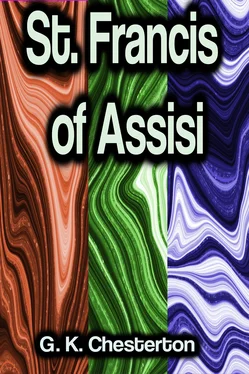Now this is simply to be stone-blind to the whole point of any story. To represent Mount Alverno as the mere collapse of Francis is exactly like representing Mount Calvary as the mere collapse of Christ. Those mountains are mountains, whatever else they are, and it is nonsense to say (like the Red Queen) that they are comparative hollows or negative holes in the ground. They were quite manifestly meant to be culminations and landmarks. To treat the Stigmata as a sort of scandal, to be touched on tenderly but with pain, is exactly like treating the original five wounds of Jesus Christ as five blots on His character. You may dislike the idea of asceticism; you may dislike equally the idea of martyrdom; for that matter you may have an honest and natural dislike of the whole conception of sacrifice symbolised by the cross. But if it is an intelligent dislike, you will still retain the capacity for seeing the point of a story; of the story of a martyr or even the story of a monk. You will not be able rationally to read the Gospel and regard the Crucifixion as an afterthought or an anti-climax or an accident in the life of Christ; it is obviously the point of the story like the point of a sword, the sword that pierced the heart of the Mother of God.
And you will not be able rationally to read the story of a man presented as a Mirror of Christ without understanding his final phase as a Man of Sorrows, and at least artistically appreciating the appropriateness of his receiving, in a cloud of mystery and isolation, inflicted by no human hand, the unhealed everlasting wounds that heal the world.
The practical reconciliation of the gaiety and austerity I must leave the story itself to suggest. But since I have mentioned Matthew Arnold and Renan and the rationalistic admirers of St. Francis, I will here give the hint of what it seems to me most advisable for such readers to keep in mind. These distinguished writers found things like the Stigmata a stumbling-block because to them a religion was a philosophy. It was an impersonal thing; and it is only the most personal passion that provides here an approximate earthly parallel. A man will not roll in the snow for a stream of tendency by which all things fulfil the law of their being. He will not go without food in the name of something, not ourselves, that makes for righteousness. He will do things like this, or pretty nearly like this, under quite a different impulse. He will do these things when he is in love. The first fact to realise about St. Francis is involved in the first fact with which his story starts; that when he said from the first that he was a Troubadour, and said later that he was a Troubadour of a newer and nobler romance, he was not using a mere metaphor, but understood himself much better than the scholars understand him. He was, to the last agonies of asceticism, a Troubadour. He was a Lover. He was a lover of God and he was really and truly a lover of men; possibly a much rarer mystical vocation. A lover of men is very nearly the opposite of a philanthropist; indeed the pedantry of the Greek word carries something like a satire on itself. A philanthropist may be said to love anthropoids. But as St. Francis did not love humanity but men, so he did not love Christianity but Christ. Say, if you think so, that he was a lunatic loving an imaginary person; but an imaginary person, not an imaginary idea. And for the modern reader the clue to the asceticism and all the rest can best be found in the stories of lovers when they seemed to be rather like lunatics. Tell it as the tale of one of the Troubadours, and the wild things he would do for his lady, and the whole of the modern puzzle disappears. In such a romance there would be no contradiction between the poet gathering flowers in the sun and enduring a freezing vigil in the snow, between his praising all earthly and bodily beauty and then refusing to eat, between his glorifying gold and purple and perversely going in rags, between his showing pathetically a hunger for a happy life and a thirst for a heroic death. All these riddles would easily be resolved in the simplicity of any noble love; only this was so noble a love that nine men out of ten have hardly even heard of it. We shall see later that this parallel of the earthly lover has a very practical relation to the problems of his life, as to his relations with his father and with his friends and their families. The modern reader will almost always find that if he could only feel this kind of love as a reality, he could feel this kind of extravagance as a romance. But I only note it here as a preliminary point because, though it is very far from being the final truth in the matter, it is the best approach to it. The reader cannot even begin to see the sense of a story that may well seem to him a very wild one, until he understands that to this great mystic his religion was not a thing like a theory but a thing like a love-affair. And the only purpose of this prefatory chapter is to explain the limits of this present book; which is only addressed to that part of the modern world which finds in St. Francis a certain modern difficulty; which can admire him yet hardly accept him, or which can appreciate the saint almost without the sanctity. And my only claim even to attempt such a task is that I myself have for so long been in various stages of such a condition. Many thousand things that I now partly comprehend I should have thought utterly incomprehensible, many things I now hold sacred I should have scouted as utterly superstitious, many things that seem to me lucid and enlightened now they are seen from the inside I should honestly have called dark and barbarous seen from the outside, when long ago in those days of boyhood my fancy first caught fire with the glory of Francis of Assisi. I too have lived in Arcady; but even in Arcady I met one walking in a brown habit who loved the woods better than Pan. The figure in the brown habit stands above the hearth in the room where I write, and alone among many such images, at no stage of my pilgrimage has he ever seemed to me a stranger. There is something of harmony between the hearth and the firefight and my own first pleasure in his words about his brother fire; for he stands far enough back in my memory to mingle with all those more domestic dreams of the first days. Even the fantastic shadows thrown by fire make a sort of shadow pantomime that belongs to the nursery; yet the shadows were even then the shadows of his favourite beasts and birds, as he saw them, grotesque but haloed with the love of God. His Brother Wolf and Brother Sheep seemed then almost like the Brer Fox and Brer Rabbit of a more Christian Uncle Remus. I have come slowly to see many and more marvellous aspects of such a man, but I have never lost that one. His figure stands on a sort of bridge connecting my boyhood with my conversion to many other things; for the romance of his religion had penetrated even the rationalism of that vague Victorian time. In so far as I have had this experience, I may be able to lead others a little further along that road; but only a very little further. Nobody knows better than I do now that it is a road upon which angels might fear to tread; but though I am certain of failure I am not altogether overcome by fear; for he suffered fools gladly.
Chapter II
The World St. Francis Found
The modern innovation which has substituted journalism for history, or for that tradition that is the gossip of history, has had at least one definite effect. It has insured that everybody should only hear the end of every story. Journalists are in the habit of printing above the very last chapters of their serial stories (when the hero and heroine are just about to embrace in the last chapter, as only an unfathomable perversity prevented them from doing in the first) the rather misleading words, "You can begin this story here." But even this is not a complete parallel; for the journals do give some sort of a summary of the story, while they never give anything remotely resembling a summary of the history. Newspapers not only deal with news, but they deal with everything as if it were entirely new. Tutankamen, for instance, was entirely new. It is exactly in the same fashion that we read that Admiral Bangs has been shot, which is the first intimation we have that he has ever been born. There is something singularly significant in the use which journalism makes of its stores of biography. It never thinks of publishing the life until it is publishing the death. As it deals with individuals it deals with institutions and ideas. After the Great War our public began to be told of all sorts of nations being emancipated. It had never been told a word about their being enslaved. We were called upon to judge of the justice of the settlements, when we had never been allowed to hear of the very existence of the quarrels. People would think it pedantic to talk about the Serbian epics and they prefer to speak in plain every-day modern language about the Yugo-Slavonic international new diplomacy; and they are quite excited about something they call Czecho-Slovakia without apparently having ever heard of Bohemia. Things that are as old as Europe are regarded as more recent than the very latest claims pegged out on the prairies of America. It is very exciting; like the last act of a play to people who have only come into the theatre just before the curtain falls. But it does not conduce exactly to knowing what it is all about. To those content with the mere fact of a pistol-shot or a passionate embrace, such a leisurely manner of patronising the drama may be recommended. To those tormented by a merely intellectual curiosity about who is kissing or killing whom, and why, it is unsatisfactory.
Читать дальше












